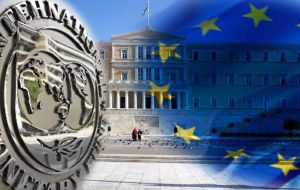MercoPress. South Atlantic News Agency
EU leaders warn Greeks the referendum vote means “yes or no to the Euro zone”
 Greek Prime Minister Alexis Tsipras has urged a 'no' vote but insists he wants Greece to stay in the Euro zone
Greek Prime Minister Alexis Tsipras has urged a 'no' vote but insists he wants Greece to stay in the Euro zone  French President Francois Hollande said ”what's at stake ... knows whether the Greeks want to stay within the Euro zone
French President Francois Hollande said ”what's at stake ... knows whether the Greeks want to stay within the Euro zone  A critical deadline looms on Tuesday, when Greece is due to pay back €1.6bn to the International Monetary Fund - the same day its current bailout expires
A critical deadline looms on Tuesday, when Greece is due to pay back €1.6bn to the International Monetary Fund - the same day its current bailout expires  UK's Chancellor of the Exchequer, George Osborne, said a Greek exit would be “traumatic” and Britain should not underestimate the knock-on effects
UK's Chancellor of the Exchequer, George Osborne, said a Greek exit would be “traumatic” and Britain should not underestimate the knock-on effects European leaders have warned Greeks that rejecting creditors' proposals in a snap referendum called for Sunday would mean leaving the Euro. German Vice Chancellor Sigmar Gabriel said the vote would be “yes or no to the Euro zone”.
Greek Prime Minister Alexis Tsipras has urged a 'no' vote but insists he wants Greece to stay in the euro. Talks between Greece and its creditors broke down last week, leading to Greek banks having to shut this week. In response to uncertainty global markets fell sharply but early trading in Asia seems to be recovering.
As well as Gabriel, the leaders of the Euro zone's other two largest economies said Greek voters would effectively be deciding next Sunday whether or not they wanted to stay in the Euro zone.
Italian Prime Minister Matteo Renzi said the choice would be between the Euro and the drachma, while French President Francois Hollande said “what's at stake is... knowing whether the Greeks want to stay within the Euro zone”.
Speaking to Greek television on Monday evening, Tsipras urged as many Greeks to vote “no” as possible on Sunday to give his government a stronger position to restart negotiations. He said his government had a mandate “to be within the European framework but with more justice”.
“They will not kick us out of the Euro zone because the cost is immense,” he said. Tsipras hinted strongly that he would resign if the result of the referendum was a “yes” vote.
“If the Greek people want to proceed with austerity plans in perpetuity, which will leave us unable to lift our head... we will respect it, but we will not be the ones to carry it out,” he said.
UK's Chancellor of the Exchequer, George Osborne, said a Greek exit would be “traumatic” and Britain should not underestimate the knock-on effects, even though it was outside the single currency. He said UK retirees who live in Greece would continue to receive their pensions, but advised British holidaymakers to take more Euros than usual.
Earlier, European Commission President Jean-Claude Juncker said he felt “betrayed” by the “egotism” shown by Greece in the failed talks on giving heavily indebted Greece the last payment of its international bailout. He said Greek proposals were “delayed” or “deliberately altered” but added the door was still open to talks.
Despite the public war of words, a Greek official said Tsipras had spoken to Juncker on Friday and asked him to extend Greece's bailout until the referendum.
A critical deadline looms on Tuesday, when Greece is due to pay back €1.6bn to the International Monetary Fund - the same day its current bailout expires. Juncker said that he still believed a Greek exit from the Euro was not an option and insisted that the creditors' latest proposal meant more social fairness.
The question which will be put to voters on Sunday will not be as simple as whether they want to stay in the Euro or not - instead it asks Greeks to approve or reject the specific terms laid out by Greece's creditors:
“Should the agreement plan submitted by the European Commission, European Central Bank and the International Monetary Fund to the June 25 Euro-group and consisting of two parts, which form their single proposal, be accepted? The first document is titled 'Reforms for the completion of the Current Program and Beyond' and the second 'Preliminary Debt Sustainability Analysis'.
”Not approved/NO; “Approved/YES”
On Saturday, the European Central Bank (ECB) decided not to extend emergency finance to the Greek banks after talks broke down. The current ceiling for the ECB's emergency funding - Emergency Liquidity Assistance (ELA) is €89bn. It is thought that virtually all that money has been disbursed.
Following the ECB announcement, Greece said its banks would remain shut until 6 July. Public transport will be free in the Athens area for a week while the banks are closed, the government says.
On Monday the Euro lost 2% of its value against the US dollar in market trading before recovering some ground. Government borrowing costs in Italy and Spain, two of the Euro zone's weaker economies, have also risen.
The Athens stock exchange is closed as part of the emergency measures.




Top Comments
Disclaimer & comment rules-

-

-

Read all commentsThe Greeks will say “ NO” and put the ball in the EU's court, bit like Argentina kicking the ball down the road, eventually they will have to deal with 30 something inflation. They bent the rules so that Greece could enter the EU now it is coming back to bite them on the foot. Thank God that Britain did not enter ( monetary system ) although we plow in Billions to keep the EU solvent.
Jun 30th, 2015 - 08:28 am 0We laugh at earlier generations for thinking the earth was flat or that the left-handed were of the devil. I sometimes wonder what future generations will laugh at us for. I'm guessing trying to keep Greece in the Euro will be at least one of them. That this generation developed the internet and stem cells and graphene will only make their confusion worse. How could the same people who did all that also try to keep an unproductive economy tied to a strong currency and at the very point where they had been proven wrong, then redouble their efforts?
Jun 30th, 2015 - 08:46 am 0Tsipras is a complete toss-pot. It is all about him and his dignity. If the public votes Yes he will quit (unless he does a Farage). He has been elected to serve the interests of the people of Greece. If they vote Yes, he should do their bidding. And he should find a tie if he wants to be taken seriously.
Jun 30th, 2015 - 09:05 am 0That aside, the opinion polls (we know all about them) are swinging wildly. It could go either way. I personally think Greece should bit the bullet and leave. They can't leave their debts unpaid but they could devalue and make like at home more sustainable in the long run. JMO
Commenting for this story is now closed.
If you have a Facebook account, become a fan and comment on our Facebook Page!